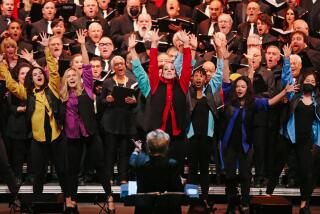William Hall Master Chorale Bids Memorable Goodbye to Its Creator
- Share via
Few artists are astute enough or lucky enough to step away from their careers at the peak of their powers. Vocal conductor William Hall is one of these.
Sunday night, Hall bid farewell to his eponymous ensemble, the William Hall Master Chorale, and to Segerstrom Hall at the Orange County Performing Arts Center, which the chorale has called home since its opening in 1986. Hall founded the ensemble in 1956; in 1989, it merged with the Orange County Master Chorale.
It was an auspicious night but not one fraught with tears or false emotion. Conductor Hall, a vigorous 68, will continue as the dean of music at Chapman University in Orange, and the ensemble is also expected to find a home there, although its name, exact form and leadership have not yet been announced.
The Sunday concert treated the milestone appropriately, with a resplendent, memorable performance of the Verdi Requiem.
For the occasion, the chorale was enlarged by the Chapman University Choir plus an Alumni Choir to 296 singers and accompanied by the Chorale Orchestra.
The choral singing achieved the technical superiority and spiritual projection always hoped for in this masterpiece. The dynamic range--from ethereal but solid pianissimos to potent volume--took one’s breath away; the clarity of the words and the chorale’s ability to communicate its meaning was awesome.
The Requiem contains many special moments. No composer puts the fear of God into an atheist more powerfully than Verdi. In the opening movement, for example, the mode changes from minor to major on the entrance of the tenor soloist, and the shift is poignant in its Schubertian transformation; it can bring tears to the eyes.
Conductor Hall and his colleagues delivered that moment effortlessly, and without any grandstanding.
Many conductors speed through the Sanctus, trying to make it a display of vocal and instrumental virtuosity. Hall found its exhilaration without passing the speed limit of Allegro. He showed similar mastery in the “Libera me” finale, which achieved drama without frenzy, seriousness without overstatement.
The four vocal soloists are all graduates of Chapman University with international and operatic credits. Basso Louis Lebherz dominated the proceedings with a beautiful sound and powerful word delivery. Mezzo-soprano Catherine Stoltz handsomely identified meaning through her clear and authoritative singing. Tenor Robert MacNeil made all his lines ring solidly. Soprano Kathryn Carpenter delivered a wonderful high C near the end but seemed to lack the temperament the rest of the “Libera me” demands.
More to Read
The biggest entertainment stories
Get our big stories about Hollywood, film, television, music, arts, culture and more right in your inbox as soon as they publish.
You may occasionally receive promotional content from the Los Angeles Times.










